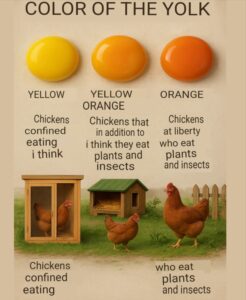
The color of an egg yolk can indeed be influenced by the hen’s diet. Hens that eat more foods rich in carotenoids, such as corn, marigold petals, or other plants with yellow or orange pigments, tend to produce eggs with deeper yellow or orange yolks. On the other hand, hens fed diets with less carotene or more grains like wheat may produce eggs with paler yolks.
When it comes to egg production, some farms may use feed additives or artificial coloring to enhance the yolk color. However, it’s essential to consider the potential impact of these practices on the nutritional quality and safety of the eggs.
If you’re concerned about the quality and safety of your eggs, you might want to consider the following options:
– Choose eggs from local farms: Buying eggs from local farms or producers can help ensure that you’re getting fresh, high-quality eggs with minimal processing and transportation time.
– Look for organic or free-range options: Eggs from organic or free-range farms may be produced using more natural methods and may have better nutritional profiles.
– Check the labeling: Look for labels that indicate the eggs are produced without artificial additives or coloring.
Ultimately, the best way to ensure you’re getting high-quality eggs is to prioritize transparency and accountability in the egg production process. By choosing eggs from reputable sources and being mindful of the potential impact of production methods on egg quality, you can make more informed choices about the eggs you eat.

One Response